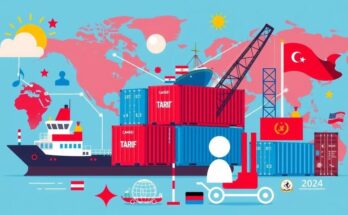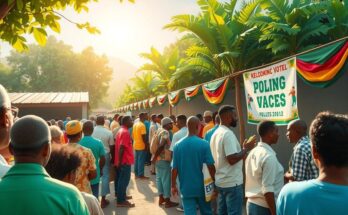Post-election unrest in Mozambique following the disputed October elections has led to significant casualties and protests, raising concerns for political stability in Southern Africa. The ruling Frelimo party’s continued dominance amid allegations of electoral irregularities poses risks for regional trade and increases the potential for further migration crises.
In the wake of Mozambique’s contentious elections on October 9, 2024, protests have erupted, leading to significant violence and unrest. The ruling Frelimo party, which has maintained power for 49 years, declared its candidate, Daniel Chapo, as the victor, sparking widespread dissent among the opposition. As a result, over 30 fatalities have been reported amidst the clashes and the situation is expected to dominate discussions at the upcoming Southern African Development Community summit. Independent candidate Venancio Mondlane, who attained 20% of the votes, has publicly challenged the election results and is encouraging mass protests against the government. This unrest is particularly alarming for Southern Africa given the region’s historical commitment to democratic principles and the successful, peaceful transitions witnessed in recent elections in countries such as South Africa and Botswana. The European Union has voiced concerns over alleged electoral irregularities, echoing previous claims of vote manipulation by Frelimo. Mozambique occupies a vital geographical position in Southern Africa, sharing borders with nations such as South Africa, Tanzania, and Zimbabwe. The ongoing instability poses risks for neighboring countries, which are dealing with their own challenges, including illegal migration. Following the unrest, South Africa has temporarily closed its border with Mozambique, a decision that severely impacts regional trade, costing its economy approximately R10 million daily based on freight volumes reliant on Maputo harbor. The political climate in Mozambique remains precarious, having emerged from a devastating civil war and currently grappling with an insurgency in Cabo Delgado province tied to ISIS. This history of violence and instability fosters a climate of uncertainty, making political stability a paramount concern not only for Mozambique but also for its southern African neighbors accustomed to ongoing migration from the troubled country. In conclusion, the post-election violence in Mozambique represents a critical concern for Southern Africa, entailing risks to political stability, economic impact on regional trade, and the potential for escalating unrest and migration patterns. The upcoming SADC summit will likely address these vital issues in a bid to restore peace and uphold democratic integrity in the region.
The recent political turmoil in Mozambique stems from the disputed results of the October 9 elections, with the ruling Frelimo party claiming victory amid accusations of electoral fraud and manipulation. Opposition leader Venancio Mondlane’s challenge to the results has incited protests that have escalated into violence, raising alarm for neighboring countries as Mozambique plays a key role in regional commerce. Given Southern Africa’s history of democratic transitions, the implications of this unrest extend beyond Mozambique and threaten stability throughout the region.
The violence resulting from Mozambique’s disputed elections highlights significant concerns for Southern Africa regarding political stability, democratic integrity, and economic repercussions. Countries in the region, already grappling with migration and stability issues, must address the threats posed by Mozambique’s crisis, particularly as it impacts regional trade and security. Immediate efforts are necessary to foster a return to peace and uphold democratic norms within the region.
Original Source: apnews.com




